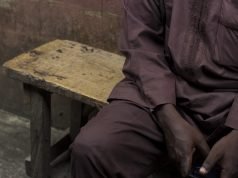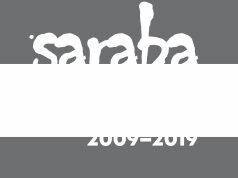FISTON MWANZA MUJILA is from Lubumbashi, Democratic Republic of Congo. His debut novel, Tram 83 was originally published in French then translated into six languages. Tram 83 won the 2015 Etisalat Prize for Literature. Even after translation, Tram 83 maintained its intensity with the innovative face of a fictitious city depicted in the novel. He draws much of inspiration of his novel from Congo but does not limit the whole phenomenon to Congo. It goes beyond it. Leaving Congo took him through a journey of self discovery of understanding it better. Fiston believes every fiction is experimental —Emily Achieng for Saraba Magazine
SARABA : Tram 83 presents a City State in an innovative setting that touches much on reality. Where can you draw the line that separates the imaginary and the real?
FISTON MWANZA MUJILA : In this novel, fiction and reality are set apart. The story’s timeline is in a fictive city, a city that readers may find anywhere in this world. You know, in most big cities in Africa or elsewhere, it is sometimes difficult to distinguish fiction from reality.
SARABA : “Literature deserves pride of place in the shaping of history. It is by way of literature that I can reestablish the truth. I intend to piece together the memory of a country that exists only on paper.” Much of your inspiration is drawn from your home country, Democratic Republic of Congo. How best do you feel the DRC represented in Tram 83?
FMM : Tram 83 covers the artisanal work in mines. This is a phenomenon that goes beyond the Congo. My source of inspiration stems partially from the Congo and from other parts of the world. I can’t give out exact figures about the percentage of the presence of the Congo in my novels. Due to the fact that the question of mines isn’t strictly limited within the Congolese borders. There is a necessity to use literature as a creative process in the creation of an artificial memory. There is no population without memory. It is the unique tool that allows a country, a population (or nation) to identify itself. To build an identity, to build projects of society, to transmit values. When a population, for any given reason, be it political censorship, memory confiscation, etc., loses its identity—the absence of memory leads to suicide.
SARABA : Do you think there’s a sense in looking at the DRC through an outsider’s eye when you leave home? Does it brighten your vision? Does it detach you in a way?
FMM : I first developed a real interest to Congo and its diaspora when I moved abroad. While based in Europe, I needed to discover more about this country. The languages, the history, the literature, the socio-economic fluctuations. I was mostly curious to learn the history of my own family. I had to leave in order to understand my country.
The journey took off with me identifying its contradictions, discovering myself. Without distance Congo would have simply been the unknown land in my eyes. You know, to be honest, in reality we do not leave our country, we simply export/take a piece of it along with us. We travel with the “fleuve,” the river, the city, the hills, the memory. I reside 8 miles away from my country, still Congo is in me. The “fleuve” is in the belly. I wrote “Congo’s fleuve runs in my veins.”
SARABA : Tram 83 was originally written in French. And maintained its intensity even after translation. What are your thoughts about this?
FMM : I never imagined my characters would one day speak English or Swedish. While writing my novels this was never an option. To translate a literary text is to translate an imaginary, a cultural base, people’s history, geographic scenery, sounds, smells, lights and the sun. The art of translating is defined as a re-creation work. This is why I consider the translation of Tram 83 not as my own text but the text of someone else. A text made by the magic of recreation!
SARABA : “The tragedy is already written; we merely preface it.” How hopeless/hopeful can things get?
FMM : Two types of humans exist. The optimistic and the pessimistic. Those who think the world
could be saved from filthiness and those who think that the world is irrecuperable. Hence, we shall take advantage of its rotteness. Requiem’s persona belongs to the second category. According to him, the tragedy is already written we merely preface it. This is just a point of view.
SARABA : Where do you see the future of Africa in experimental fiction writing?
FMM : The genesis of African Literature came before me. I don’t know how it will turn tomorrow or tonight. From Chinua Achebe to Marechera, Zakes Mda, Tsistsi Dangarembga and Chimamnda Ngozi Adichie. They all hold surprises. I wouldn’t know how to envision and tell you about the Africa of tomorrow in the fictive world. However, I believe every fiction is experimental. By that I mean it is a desperate attempt to understand the world. One truth stands, that is the need of fiction. We need fiction, as a matter of fact a lot of fiction, any sort of fiction, much more fiction, to tell Africa in its moment of glory and rottenness.
SARABA : How does it feel to win the Etisalat Prize for Literature 2015?
FMM : The Etisalat Price for Literature is the first and largest Pan-African Prize dedicated to literature. I am honored by this wonderful award which legitimizes my writings. It makes my work visible across the world and mostly Africa. This is a prize that makes my mother and my country proud.
SARABA : What are your plans for the one year fellowship at the University of East Anglia?
FMM : This will be a great opportunity for me to consecrate on writing but also help me get in touch with the literary world, especially with English speaking readers and writers. I am sure this prize will open great doors: literature.
































